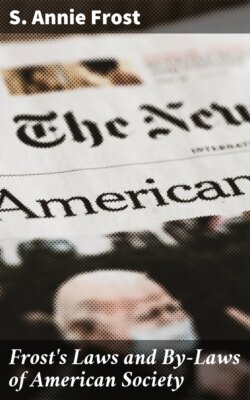Читать книгу Frost's Laws and By-Laws of American Society - S. Annie Frost - Страница 9
На сайте Литреса книга снята с продажи.
CALLS.
ОглавлениеWHEN ladies have, according to the French custom, set apart one morning or one evening in the week for receiving callers, it is a breach of etiquette to call at any other time, unless a short visit in the city or business that will not admit of delay are the excuses. An hour in the evening, and from ten to twenty minutes in the morning are the limits for a formal call.
When there is no time thus set apart, formal calls must be paid in the morning, but with friends of long standing the evening call is not only permissible, but often far more welcome.
Morning calls may be made by gentlemen in society upon all the occasions following:
In answer to a letter of introduction sent to him, or to return the call if the letter is personally presented.
In return for any hospitality offered to him when visiting another city, if the entertainer visit his own place of abode.
In return for any favor received or courtesy extended to him by another gentleman.
In return for an invitation to the house of a friend, whether the invitation has been accepted or declined, and this call must be made within the week following that during which the entertainment was given.
On any occasion when a grief or a joy calls for expressions of condolence or congratulation in the circle of his friends.
To greet the safe return of any friend who has been abroad, or away from home for any length of time.
Following any occasion when a lady has accepted his services as an escort, a gentleman must call to inquire after the health of his fair charge, and must not delay longer than the day after that upon which he has escorted the lady.
After a wedding, at the time appointed for the reception of friends.
When visiting in another city, upon any friends there, or upon those to whom letters of introduction have been given.
In asking or granting a favor, a call is demanded by etiquette.
The visit or call is a much better institution than the vulgar suppose. It is not without its objections, consuming valuable time, and giving occasion for gossip and small talk, but it is the most agreeable and customary way of turning a mere acquaintance into a friend. In a friendly call much of the restraint of meeting in large assemblies is thrown aside, mind meets mind much more easily in an easy tete-a-tete conversation, and the conversation may be allowed to partake somewhat more of a personal character than it could in the ball-room or evening party.
First calls require prompt return, even if you drop the acquaintance before the second one.
Morning calls must never be earlier than noon, evening ones never later than nine o'clock.
When calling, if the room seems crowded, do not prolong your visit.
A gentleman may never call with a friend upon a lady, unless the friend is previously acquainted, or he has obtained permission of the lady to introduce him.
In making a formal call, a gentleman must retain his hat in his hand. An umbrella or cane may be left in the hall, never the hat or gloves. If the call is made in the evening, the hat and gloves must be held until the host or hostess gives an invitation to lay them aside and spend the evening. Strict etiquette requires that such an invitation shall not be given, or if given, not accepted on the occasion of a first call.
In making an informal call in the evening, a gentleman may leave hat, gloves, cane and overcoat in the hall.
No gentleman will prolong a call if he finds his host or hostess dressed to go out. A brief visit with a promise to repeat it will place his entertainers at ease, and even if they urge a longer stay, the very fact that they were preparing to go out, proves their desire to do so.
A card used in calling must never have anything upon it, but the name and address of the caller. Nothing can show a greater ignorance of the customs of society than to use a business card for a friendly call. A physician may put the prefix Dr. or the professional M.D., upon his card, and an Army or Navy officer his rank and branch of service. Thus a civilian's card must be simply:
JAMES LAWTON, 417 L— Street.
A physician's:
DR. JEROME HAYES, 218 T— Street, or
